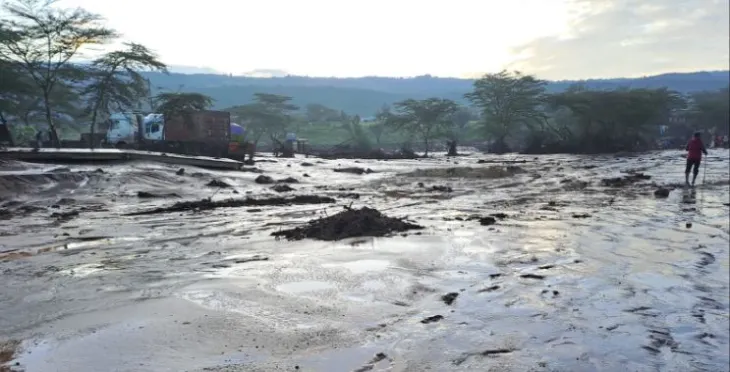State must stop aloof approach to floods disaster

The heavy rains and floods ravaging the country have placed the government under sharp scrutiny over its responsibility to citizens’ rights.
Images of people and homes being swept away by the raging waters have been beamed on TV and social media sites, as the death toll approaches 100.
Nearly 200,000 have been rendered homeless or displaced as rivers burst their banks and inundated low-income neighbourhoods, including the densely populated Mathare and Kibera settlements in Nairobi.
Images of videos of people including women and children on rooftops of submerged houses. Popular celebrity comedian Eric Omondi trended as he rowed a boat to save marooned Mathare residents.
His quick empathetic action resonated with the prevailing public view of the government’s perceived lackadaisical attitude towards the majority suffering economic hardship compounded by environmental disasters.
Citizens reacted with resigned caution to President William Ruto setting up a multi-agency government response team to respond to the flood crises.
They are wary of perennial hazards with no respite despite countless high-level promises of permanent intervention.
The National Disaster Response Committee’s impact has not been adequately felt when and where it is needed most, be it flooding, a pandemic, drought, accidents or when buildings collapse.
A recent Auditor-General report revealed that both national and county governments are ill-prepared to respond to emergencies or natural hazards.
Preventing disasters, reducing, and managing risk, and responding to extreme phenomena are essential in achieving a sustainable future for all citizens.
The government has appeared rather condescending in responding to the plethora of challenges facing wananchi amid scandals and misdeeds.
That perception, common among the public, is validated by the State’s cavalier stance on the doctor’s strike now in its 50th day.
Fears are mounting that amid the devastating rains, flooding and accompanying risks including infrastructure damage and the disruption of goods and services, a public health crisis is looming. The floods threaten outbreak of diseases.
Woe betide the authorities and elected officials if public health crises erupt when they are seen to be insensitive to the rights of the professionals who can help control it. On this, citizens are behind the doctors and their rights, not politicians.
Has an administration that rode into office on a well-choreographed “bottom-up” mantra ostensibly to address the myriad problems facing “hustlers” transformed into a “top-down” orchestra?
Have the people’s rights and expectations and desires enshrined in the Constitution through the principle of public participation and the Bill of Rights been subjugated to a domineering political and economic State apparatus?
Virtually every facet of decision-making directly affecting the people appears to be secondary to the interests of the powers-that-be.
The media (on behalf of the people) must now speak the truth to power. This Friday, 4 May, journalists worldwide will mark World Press Freedom Day.
Coincidental to the Kenyan situation, this year’s theme is freedom of expression in the context of the current global environmental crisis.
Ensuring visibility of climate change-related governance issues like those linked to the current flooding disasters and how the State responds is crucial in saving lives and promoting peace and democratic values.
The government needs to shed its perceived image of a lack of empathy for the plight of vulnerable citizens.
It must transparently respond to the crying need for a whole-of-society approach to disaster risk reduction, ensuring that no one is left behind.
—The writer comments on environmental issues —albertoleny@gmail.com












